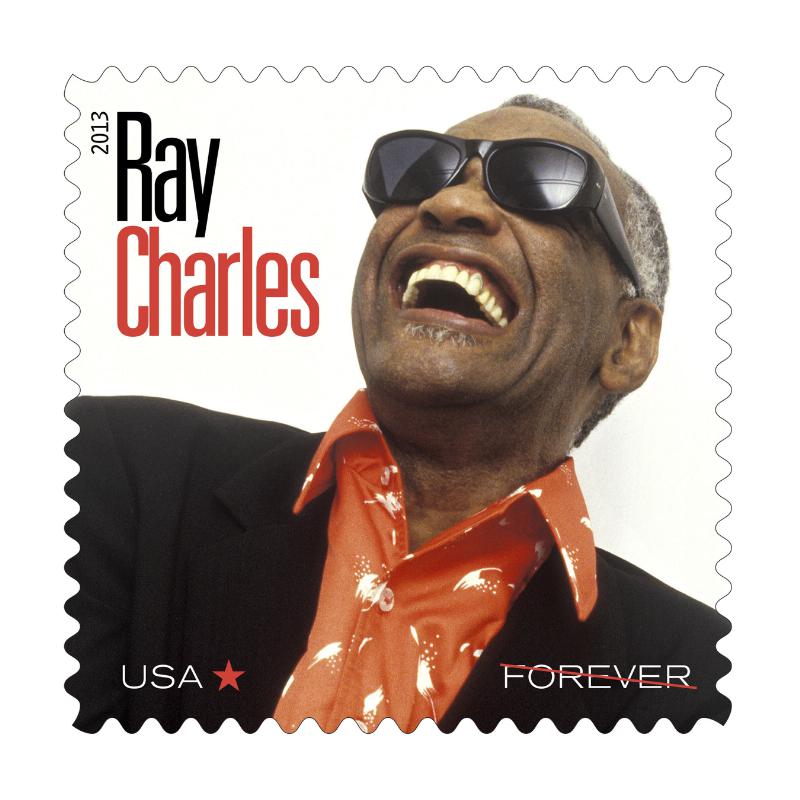WASHINGTON — On what would have been his 83rd birthday, the “father of soul,” Ray Charles, was the latest inductee into the United States Postal Service’s Music Icons Forever Stamp Series on Monday, September 23rd.
“Frank Sinatra, himself a stamp honoree, once characterized Ray Charles as ‘the only true genius in show business,’ and certainly, if anyone was a musical genius, it was Ray Charles,” said U.S. Postal Service Judicial Officer William Campbell who dedicated the stamp at the Atlanta ceremony.
“Despite being blind and having a young life marked by tragedy, hardship and tremendous challenges, Ray Charles went on to have a remarkable 58-year career playing music that blurred the lines of jazz, gospel, blues and, in later years, country. In doing so, he became the personification of the American Dream,” Campbell added.
Born Sept. 23, 1930, in Albany, GA, Ray Charles Robinson was raised in the small town of Greenville, FL, where a local boogie-woogie pianist gave him his first piano lessons. At the age of five, Charles began to go blind. His right eye was surgically removed. While he received lessons in classical piano and clarinet, Charles taught himself to play saxophone while continuing to listen to a mix of jazz, blues and country music.
The Ray Charles Forever Stamp features an image of Charles taken later in his career by photographer Yves Carrere. The stamp sheet was designed to evoke the appearance of a 45 rpm single peeking out of a record sleeve above the stamps themselves.
On the reverse side, the sheet includes a larger version of the photograph featured on the stamp as well as the logo for the Music Icons series. Art director Ethel Kessler worked on the stamp pane with designer Neal Ashby.
“It is with great pleasure that we honor a man who not only had an incalculable impact on the face of contemporary soul, R&B, gospel and rock, but also touched people individually,” said U.S. Postal Service Sales Vice President Cliff Rucker who dedicated the stamp in Los Angeles event.
“The third in our new Music Icons series, Ray Charles’ stamp, another tribute to his legacy, will join those of distinguished performers Lydia Mendoza and Johnny Cash, which were dedicated earlier this year,” Rucker said. “And how fitting that Ray Charles and Johnny Cash, who in life were such great friends and recorded two duets together, will be reunited in the form of postage stamps.”
USPS highlighted the occasion with performances by R&B singer Chaka Khan in Los Angeles while singer Ashanti highlighted an event in Atlanta. Ashanti performed a medley of his songs while the Morehouse College Glee Club song his hit song “Georgia on My Mind,” which also serves as Georgia’s state song. In Los Angeles, ten-time Grammy award winner, singer, songwriter, actor and activist Chaka Khan sang Charles’ “I’ll Be Good to You.”
Charles and Khan re-recorded the 1976 hit written by the Brothers Johnson. With the remake of “I’ll Be Good to You,” produced by Quincy Jones, the song became another number one R&B hit on the Billboard charts, which was Charles’ first number one R&B hit in 24 years. In 1991, Charles and Khan won a Grammy for “I’ll Be Good to You” for the Best R&B Performance by a Duo or Group with Vocals. Charles won a precedent 17 Grammy Awards.
“Ray Charles taught us the value of hard work and determination, how to overcome challenges and how to tap the genius inherent in each person,” said Valerie Ervin, President of The Ray Charles Foundation, who spoke at the Los Angeles event. “We are extremely grateful that the Postal Service is celebrating this legacy with the release of a stamp in Ray Charles’ honor.”
The limited-edition Ray Charles Forever Stamp as well as Ray Charles Forever, a deluxe CD collection featuring the unreleased recording of “They Can’t Take That Away From Me” and the exclusive bonus track, “I Didn’t Know What Time it Was,” will be available at major Post Office locations across the country, as well as online at usps.com/stamps and ebay.com/stamps.
